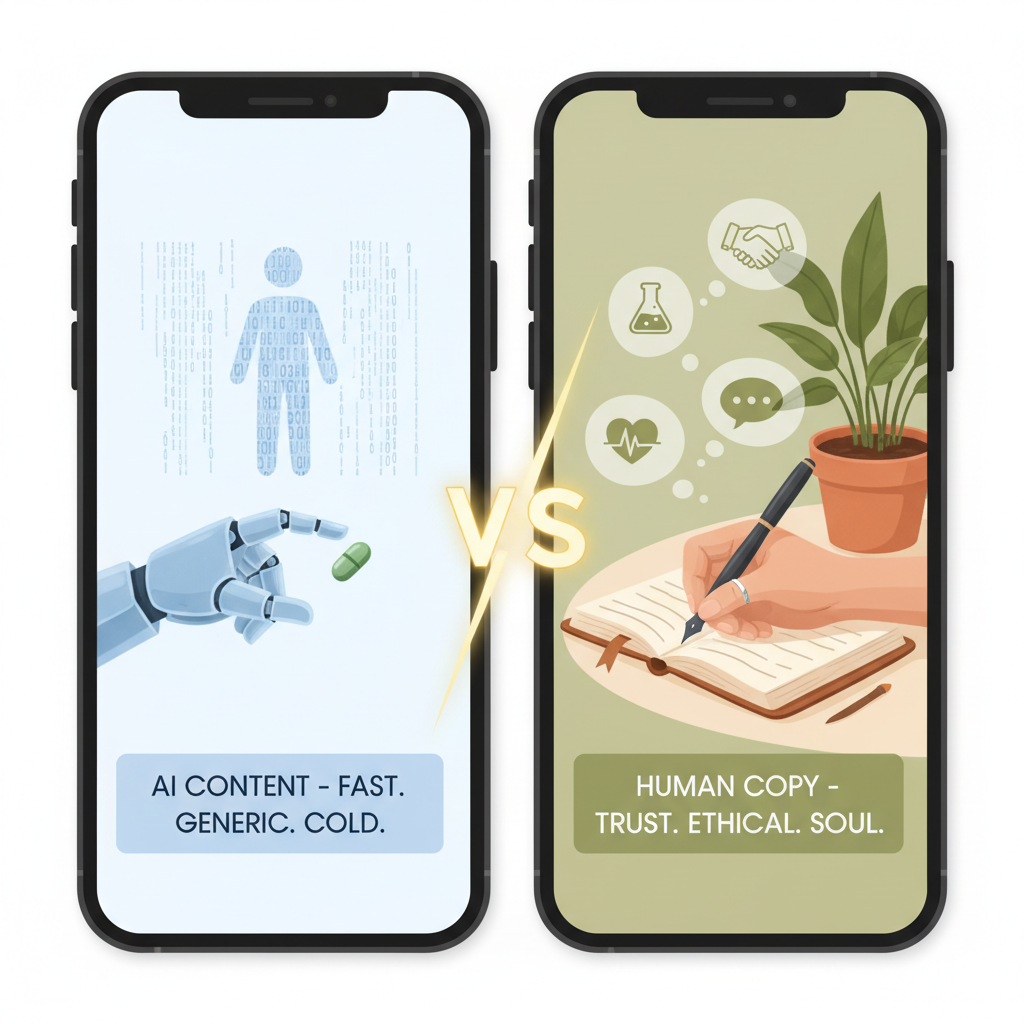
Why Ethical Wellness Copywriting Always Wins
In the age of instant content generation, the wellness industry has found itself at a crossroads. On one side, there’s the speed and volume of Artificial Intelligence (AI). On the other, there’s the imperative of trust, authority, and safety, which is non-negotiable in health.
The reality is simple: AI is great at generating words. But in Wellness, words alone aren't enough.
The U.S. consumer is more skeptical than ever. A recent survey showed that 87% of consumers are concerned about medical misinformation. This creates a massive trust gap, and far too many wellness brands are outsourcing their content strategy to generic AI tools just to hit a deadline, widening that gap further.
AI can’t write credibility. It can only write content.
If you want to move past cheap clicks and build a brand that lasts, your marketing copy must reflect a commitment to human expertise and safety. This is the difference between generic AI and truly ethical wellness copywriting.
The Three Pillars of Credible Wellness Content
The moment your audience can tell your content was written in five seconds by a prompt, you lose the opportunity to build long-term trust. Ethical content strategy is how the leading brands are winning the market right now:
1. Show the Proof, Don't Just Promise Vague Results.
Generic AI's default is exaggeration because it's trained on the most popular, often sensational, claims. The ethical strategy, by contrast, is rooted in measurable, verifiable reality.
Instead of writing vague claims like, "Our supplement boosts your focus by 40%," you must ground your copy in evidence: "In our double-blind study, users reported a measurable 40% improvement in sustained focus." When you cite the source, link to the study, or reference a specific mechanism, you're not just writing a sentence, you are building your Authority (the "A" in Google’s E-E-A-T guidelines). This is a foundational step in how to build trust in health content.
2. Solve a Root Problem, Don't Just Sell a Feeling.
AI excels at generating aspirational, high-level "feel-good" statements that lack depth. The modern consumer wants to know you understand their daily struggles and the underlying science.
Instead of generic lines like, "Feel great and energetic every day," your copy must speak to the root issue: "Tired of the 3 PM crash? We rewrote our entire formula to address the root cause, so your energy is stable without the jitters."
Ethical copy focuses on the map and the method ("targeting the fatigue cycles") rather than just the destination ("Feeling great"). This level of detail shows human expertise and helps you avoid falling into the trap of wellness misinformation.
3. Commit to Values, Don't Just Chase Trends.
A quick AI prompt can generate 50 blog posts about the latest fad diet. An ethical brand's content strategy is a deliberate reflection of its core scientific and moral principles.
This means replacing trendy topics with substance. Rather than writing about "quick weight loss tips," focus on your brand's values: "We don’t write about 'weight loss.' We write about sustainable energy, body confidence, and measurable health markers." Furthermore, instead of simply saying your ingredients are natural, you must be transparent: "We source our ingredients from certified organic farms and provide full batch-level COAs (Certificates of Analysis) for every product."
The U.S. wellness buyer is smart. They will not pay a premium for copy that sounds like it was written in 3 seconds. By embedding your evidence, you are actively performing authentic health claims that Google and your customers reward.
How to Use AI Ethically (The Hybrid Approach)
AI is not the enemy of ethical content, but it cannot lead the process. The most sustainable and ethical model is the hybrid approach: AI for speed, Human for safety, strategy, and soul.
- AI for Speed: Use AI to generate draft outlines and identify long-tail keywords (e.g., ethical marketing claims for supplements).
- Human for Safety and Proof: You must write the introduction, the key claims, and cite all the scientific backing. This is the core of the human-edited AI content strategy.
- The Ethics Gate: Every piece of AI-generated content must pass a human-led "Ethics Gate" review: Is every claim verifiable with a linked source? Does the tone sound overly promotional or genuinely helpful?
Show your audience the human intelligence, the clinical depth, and the care that AI simply cannot replicate. That is the only defensible strategy left for long-term brand success and high conversions.
A Note on Professional Copywriting Standards
In the self-improvement space, trust is your greatest asset. My approach ensures your content is not only inspiring and persuasive, but built on ethical standards and defensible compliance. General advice is never enough, you need audit-proof copy that protects your mission
Want to know what's better? Read AI vs. Expert Copywriter: The Single Biggest Difference
Post a comment